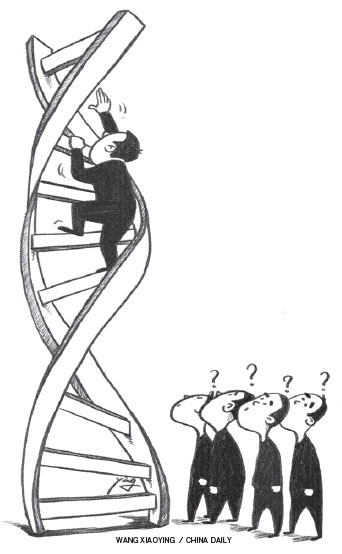Study on gene-editing tool sparks debate
Editor's Note: Han Chunyu, an associate professor of biology at Hebei University of Science & Technology, impressed researchers across the globe this May with his paper on NgAgo, a new-generation gene-editing tool. Yet several overseas scientists say they have not been able to repeat the experiment and have asked him to publish the original data. Following are the views of two scholars on the issue:
Too early to jump to any conclusion
When a scientist observes a phenomenon or successfully completes an experiment, his/her conclusion will not be accepted until other researchers can also observe it or repeat the experiment under similar conditions.
That's the problem Han faces: No other researcher has been able to repeat his experiment yet. So his conclusion that NgAgo is a better gene-editing tool is still not considered reliable. Worse, many laboratories cannot detect the endonuclease enzyme activity of NgAgo, which is a prerequisite for Han's experiment.
There could be several reasons for that. For example, some labs may have repeated his experiment but are yet to publish the fact. Or, Han might have not revealed a detail (or details) that is key to the experiment in order to protect his intellectual property rights.
Actually, those asking him to publish the original data are not challenging his achievement. Gaetan Burgio, a senior researcher from Australian National University, recently wrote a blog on his Twitter account: "I think rather than to chase high impact publications and be secretive, we should be more open and share our results to avoid everyone wasting their time on results that are irreproducible and pointless. In my opinion this is the way science should work."
There are several examples of serious flaws with researchers' important data. Haruko Obokata, a researcher from Japan, claimed to have found Stimulus-Triggered Acquisition of Pluripotency cells that are similar to stem cells in January 2014, yet her "discovery" could not be repeated and was declared false three months later. She lost her position and her research supervisor committed suicide.
Han initially responded by giving some details about his experiment and said he is confident others will be able to repeat it in the future. Now, we need to wait - time will prove whether Han kept something secret or whether he conducted the experiment under special conditions that others do not know. It is too early to jump to any conclusion.
Zhang Tiankan is deputy editor-in-chief of Encyclopedia magazine and a former researcher in medical science.
Scientist obliged to clear doubts
It is not rare for scholars to challenge a fellow researcher who has made a new discovery. The more they challenge, the more details need to be tested and technology improved. And in case a researcher has falsified the data, he/she stands discredited. Either way, science progresses.
That's why researchers' demand for Han to publish his original data is normal. Initially, Han responded by submitting plasmid information to Addgene, a global non-profit organization that helps share such information, and giving plasmid samples as gifts during a lecture.
Even before that, Han had written an article in response to the challenges, advising those trying to replicate his experiment. That's a positive, open attitude that helps clarify a lot of things.
But his university's attitude is rather different; reports say it has not responded at all and has even asked Han to stop responding. Challenges are very important for researchers who wish to improve their work, and if their universities adopt an ostrich policy, they will only arouse more doubts.
Han's university lapped up all praise lavished upon it when he published the paper, but now it has adopted silence. It is time the university abandoned the ostrich policy and Han opened up about his research. If they publish all the original data and NgAgo proves a better tool than the existing ones, they will be lauded further.
Xiong Bingqi is vice-president of Shanghai-based 21st Century Education Research Institute.

























